

BLUES MINDMAP. 6 blues Chicago. 5 blues delta. 4 blues jugbands fiddle. 3 blues worksongs. 2 blues africa. 1 blues intro. History and Origins of Blues. History and Origins of Blues. What is the Blues?- Walk through Blue Music History. Riffnotes Presents History of the Blues featuring Joe Bonamassa - Chapter 1. The Rise of the Country Blues. The Blues . Blues Classroom. The blues is one of America's greatest musical treasures.
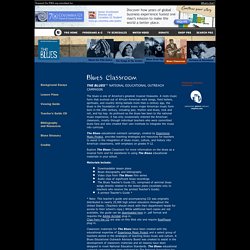
A roots music form that evolved out of African-American work songs, field hollers, spirituals, and country string ballads more than a century ago, the blues is the foundation of virtually every major American music form born in the 20th century, including jazz, rhythm and blues, rock and roll, and hip hop. As profound as the blues has been to the national music experience, it has only occasionally entered the American classroom, mostly through individual teachers who were committed blues fans and who created their own methods to integrate the music into curricula.
Heebie Jeebies - Ces chansons qui font l'histoire. Songs of the Underground Railroad - Wikipedia. Songs of the Underground Railroad were spiritual and work songs used during the early-to-mid 19th century in the United States to encourage and convey coded information to escaping slaves as they moved along the various Underground Railroad routes.
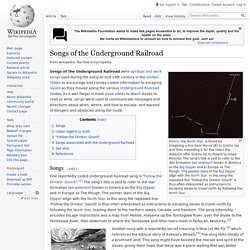
As it was illegal in most slave states to teach slaves to read or write, songs were used to communicate messages and directions about when, where, and how to escape, and warned of dangers and obstacles along the route. Songs[edit] Another song with a reportedly secret meaning is Now Let Me Fly [3] which references the biblical story of Ezekiel's Wheels.[4] The song talks mostly of a promised land. This song might have boosted the morale and spirit of the slaves, giving them hope that there was a place waiting that was better than where they were.
Music is important in the religion of African Americans today, as it was in the telling of freedom. [5][6][7][8][9][10][11] Frederick Douglass was an escaped slave and abolitionist author. Work song - Wikipedia. A work song is a piece of music closely connected to a form of work, either sung while conducting a task (usually to coordinate timing) or a song linked to a task which might be a connected narrative, description, or protest song.
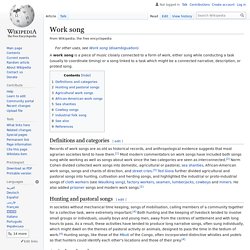
Definitions and categories[edit] Records of work songs are roughly as old as historical records, and anthropological evidence suggests that all agrarian societies tend to have them.[1] Most modern commentators on work songs have included both songs sung while working as well as songs about work, since the two categories are seen as interconnected.[2] Norm Cohen divided collected work songs into domestic, agricultural or pastoral, sea shanties, African American work songs, songs and chants of direction and street cries.[3] Ted Gioia further divided agricultural and pastorals songs into hunting, cultivation and herding songs, and highlighted the industrial or proto-industrial songs of cloth workers, factory workers, seamen, lumberjacks, cowboys and miners.
A.L. Song Activity: African American Work Songs and Hollers. "African American Work Songs and Hollers " by Sandy Pekar and Judie Whittaker Purpose The purpose of this lesson is to demonstrate informal, secular music used by African-Americans especially during the period between emancipation and 1900.
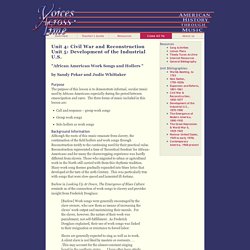
The three forms of music included in this lesson are: Call and response – group work songs Group work songs Solo hollers as work songs Background Information Although the roots of this music emanate from slavery, the continuation of the field hollers and work songs through Reconstruction testify to the continuing need for their practical value. Barlow in Looking Up At Down, The Emergence of Blues Culture reminds us of the connection of work songs to slavery and provides insight from Frederick Douglass: [Barlow] Work songs were generally encouraged by the slave owners, who saw them as means of increasing the slaves’ work output and maintaining their morale. Southern Mosaic: The John and Ruby Lomax 1939 Southern States Recording Trip, Work Songs. Audio Recording Slow Drag Work Song Contributor: Unidentified Performers - Lomax, John A.
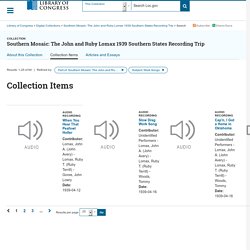
(John Avery) - Lomax, Ruby T. (Ruby Terrill) - Woods, Tommy Date: 1939-04-16 Audio Recording Cap'n, I Got a Home in Oklahoma Contributor: Unidentified Performers - Lomax, John A. (John Avery) - Lomax, Ruby T. (Ruby Terrill) - Woods, Tommy Date: 1939-04-16 Audio Recording Long Hot Summer Day Contributor: Unidentified Performers - Lomax, John A. (John Avery) - Lomax, Ruby T. GCSE Bitesize: Origins of the blues.